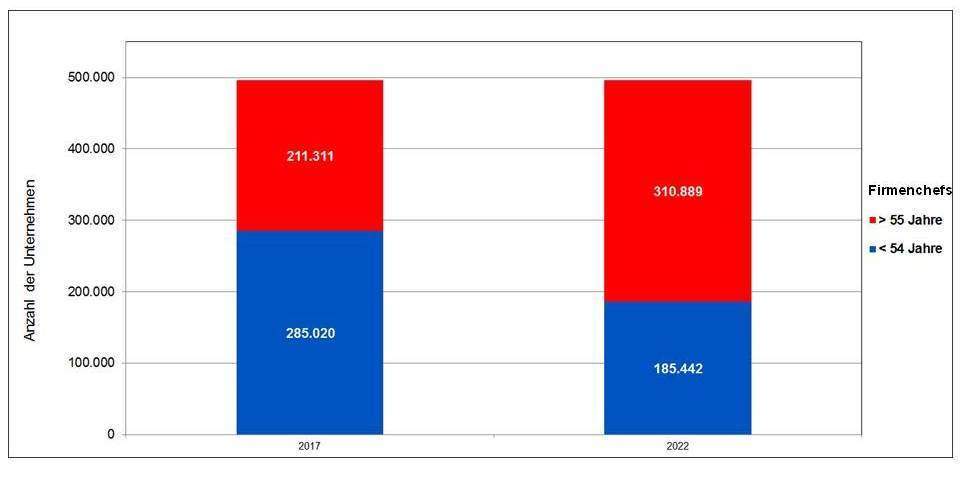Much has already been written about the lack of business successors. The fact is: Germany’s entrepreneurial population is ageing rapidly. In other words, in just five years three out of five entrepreneurs will be well over 55 years old. This is the result of an analysis of all 79 German IHK districts. The study on generational change in companies was conducted by the consulting group KERN Unternehmensnachfolge. Successful. It confirms the pressure on family entrepreneurs in Germany to take action.
The study therefore focuses on the age development of family entrepreneurs in Germany. A total of 564,443 companies in the turnover categories of 250,000 euros to 5 million euros were recorded. Companies with a turnover of up to 50 million euros were also included. The data of almost 500,000 companies with annual turnover of less than 5 million euros and a further 65,000 companies with annual turnover of more than 5 million euros were thus included in the analysis.
Furthermore, the number of managing directors/shareholders was analysed in three age groups:
- 50 ? 54 years
- 55 ? 64 years
- over 65 years.
Lack of business successors becomes more and more visible
The most important result of the study is the dramatic ageing of German bosses. This is because the cohorts of entrepreneurs with the highest birth rates in this republic are slowly having to think about retirement:
- Meanwhile, 42% of all company leaders are already older than 55.
- The number of small and medium-sized enterprises in Germany that will have to organise a succession for their boss will increase by around 63% to 311,889 by 2022, ultimately affecting over 1.5 million jobs in Germany.
Furthermore, the company data were also subdivided according to their industries. Thus, they provide a previously unknown detailed insight into the succession facts of the respective industry.
It is important to understand that in the German Mittelstand, more than 90% of family businesses employ fewer than 25 people and generate less than 5 million euros in turnover,’ says Nils Koerber, founder of KERN ? Company Succession. More successful.
KERN partner Ingo Claus adds: ‘Due to demographics, securing succession is currently the most important issue for small and medium-sized businesses. In times of a lack of skilled workers, entrepreneurs must look for successors for their employees, managing directors and themselves. In any case, the analysis shows that in five years more than 60% of all owners and managers in Germany will be 60 years old or older?
Professional preparation of a company sale pays off
The shortage of business successors is already becoming apparent: as a result of this age trend in family businesses, an investment backlog and a dangerous loss of substance often also accompany it. The experts at KERN warn: Depending on their personal state of health, the majority of German family businesses therefore face a key question within a few years. It is a matter of regulating their succession reliably and with an eye to the future.
Demographic development creates a problem for young people
Where are the subsequent entrepreneurs supposed to come from? Ingo Claus against the background of the demographic development. The low birth rate is already creating a dramatic shortage of skilled workers. As a result, they automatically entail a shortage of business successors. The organisation of successful generational changes is therefore also the greatest risk for the future of German family businesses?
A professional preparation and sufficient time for the search are therefore the be-all and end-all for success in this question, which is also existential for millions of employees. Successfully organised succession arrangements are thus becoming even more of a future issue for the further development of the economic and innovative strength of the Federal Republic of Germany,” says Koerber. The succession specialist is more and more frequently confronted with consulting clients where succession is no longer economically feasible due to ageing and a loss of substance.
You can also download the exact individual data of the respective chamber districts in Germany via this link:
https://www.kern-unternehmensnachfolge.com/studie-unternehmensnachfolge/
Tips for further reading:
Live Seminar ? My change of baton company purchase
Interview: Preparing the succession within the family well
Practical example of a successful company succession in the skilled crafts sector
Company successions in Münster and North Westphalia are increasing strongly
Comment: Unresolved company successions endanger our prosperity
Company succession in Bavaria as a driver of innovation
Company successions in Switzerland: Every eighth SME is looking for a successor
One third of all craft enterprises face business succession in Grafschaft Bentheim
KfW - Analysis: Company succession a burning issue in SMEs
The costs of a business succession or an M&A project
How do you recognise a reputable business sale advisor?
The cohorts of entrepreneurs with the highest birth rates are about to retire. This is because 42% of the company heads are already over 55 years old today. This means that the number of businesses capable of succession will rise to 311,889 (+63%) by 2022.
At the same time, there is an acute shortage of entrepreneurs of the younger generation nationwide. This goes hand in hand with the well-known problems such as a lack of skilled workers and demographic change.
Professional preparation of the succession. Sufficient time should also be planned for the search for a successor. After all, this is also an existential question for millions of employees. Unfortunately, more and more often a succession is no longer economically feasible. The reasons for this are usually obsolescence and loss of substance.

